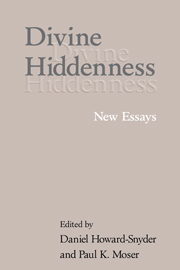Book contents
- Frontmatter
- Contents
- List of Contributors
- Introduction: The Hiddenness of God
- 1 What Is the Problem of the Hiddenness of God?
- 2 What the Hiddenness of God Reveals: A Collaborative Discussion
- 3 Deus Absconditus
- 4 St. John of the Cross and the Necessity of Divine Hiddenness
- 5 Jonathan Edwards and the Hiddenness of God
- 6 Cognitive Idolatry and Divine Hiding
- 7 Divine Hiddenness: What Is the Problem?
- 8 A Kierkegaardian View of Divine Hiddenness
- 9 The Hiddenness of God: A Puzzle or a Real Problem?
- 10 Seeking But Not Believing: Confessions of a Practicing Agnostic
- 11 The Silence of the God Who Speaks
- Bibliography
- Index of Names
- Index of Subjects
10 - Seeking But Not Believing: Confessions of a Practicing Agnostic
Published online by Cambridge University Press: 10 November 2009
- Frontmatter
- Contents
- List of Contributors
- Introduction: The Hiddenness of God
- 1 What Is the Problem of the Hiddenness of God?
- 2 What the Hiddenness of God Reveals: A Collaborative Discussion
- 3 Deus Absconditus
- 4 St. John of the Cross and the Necessity of Divine Hiddenness
- 5 Jonathan Edwards and the Hiddenness of God
- 6 Cognitive Idolatry and Divine Hiding
- 7 Divine Hiddenness: What Is the Problem?
- 8 A Kierkegaardian View of Divine Hiddenness
- 9 The Hiddenness of God: A Puzzle or a Real Problem?
- 10 Seeking But Not Believing: Confessions of a Practicing Agnostic
- 11 The Silence of the God Who Speaks
- Bibliography
- Index of Names
- Index of Subjects
Summary
For some, belief in God – that is, belief in a perfect supernatural person – is very naturally produced or sustained by religious experiences. If, however, there is a God, then I suspect his plan for me is more subtle. For though I occasionally have experiences at least analogous to those Rudolf Otto calls “numinous,” they are vague and fleeting – they don't come close to producing belief. And while I do feel strongly inclined to form beliefs about God when I read theistic scriptures, the beliefs are of the sort, “Surely this wasn't inspired by God”; so what Calvin calls “the secret testimony of the Spirit” is clearly a secret kept from me. In general, then, I simply do not have vivid experiences of the sort that directly cause people to believe in God. Seeing is believing, but if God is real then I suffer from religious blindness or at least blurred religious vision.
Of course, the visually impaired can make inferences about what they cannot clearly see. And, because of my philosophical training, I am confident (some would say overconfident) in my ability to make correct inferences concerning God's existence. But after years of searching and researching, I have come to believe that the inferential evidence concerning God's existence is, at least at the present time, ambiguous. One consequence of this is that I am an agnostic. I don't believe with any confidence that God exists, nor do I believe with any confidence that God does not exist. Though I won't be terribly surprised if I one day meet my maker, I also take seriously the possibility that I have no maker, that nature is a closed system.
- Type
- Chapter
- Information
- Divine HiddennessNew Essays, pp. 197 - 214Publisher: Cambridge University PressPrint publication year: 2001
- 10
- Cited by

